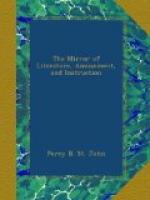the stranger soon opened it before him, as it seemed,
to take out some articles which were necessary for
his use at night; and displayed in the process several
large bags—larger almost than the machine
would have seemed able to contain—which
were evidently full of gold or silver money.
The cupidity of Conrad was excited by this view, and
he would gladly have at once secured the prize even
at the hazard of a personal struggle with the stranger;
but the people of the inn (according to his account
afterwards) were such as would have expected a portion
of the spoil. For this reason, although unwillingly,
and trusting himself to sleep little, lest by any chance
the prey should escape him, he abandoned his design
of robbery, for that night; and on the next morning,
having learned which way the stranger travelled—for
the latter exhibited no suspicions or apprehension
of those about him, but spoke freely of his intended
road, though he never mentioned anything of the charge
he carried—having ascertained this fact,
he allowed the rider to depart, and after a short
time, followed by a shorter track through the forest,
which was practicable only to persons on foot, and
which would enable him, had he even started later,
easily to overtake the mounted traveller. Now,
knowing that his nearer road saved, as has been noticed,
full a league of ground, the “Woodsman”
moved on slowly; and accounted that, when he reached
the point at which they were to meet, he should still
have some time to wait for the stranger: on emerging,
however, into the high road, he found him to his surprise
already approaching; and, what was still more
extraordinary, mounted upon a black horse,
when that on which he had left the inn, had certainly
seemed to be a brown. The portmanteau, however,
which was all that Conrad looked to, was still behind
the traveller, and on he came riding as if nothing
at all was the matter: the “Woodsman”
never hung back, or staid reflecting, but levelled
his rifle, and called upon him to “Stand and
deliver,” or his next moment was his last.
The traveller upon this pulled up his horse with an
air of great coolness; and, looking upon Conrad, said
something, which, as the robber since says, he verily
believes was—“That he hoped he had
not kept him waiting!”—or
words to that purpose; but he was too busy at the time
to pay much attention to discourse. “Do
you know who it is you are going to rob though?”
asked the stranger, addressing the “Woodsman”
directly. “Not I,” replied the latter,
boldly: “but, if you were der Dyvel himself,
descend from that horse, and deliver the bags of money
that you have on you, or you shall die!” Upon
this, the black rider said no more; but dismounted
quietly, although he had pistols in his holsters; and
Conrad, immediately taking the portmanteau from the
horse’s back, was so eager to be sure of the
contents, that he drew his knife, and cut the fastenings
on the spot. In the meantime, the traveller might




